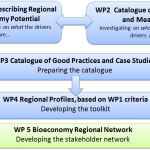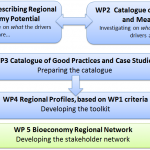BERST series of posters on project outcomes
The aim of the BERST project was to gain understanding of the possibilities and challenges related to the enhancement of bio-based economies. BERST outcomes are accessible through two catalogues, hosted by VITO and by WUR respectively. The catalogues can be useful for a wide variety of stakeholders, from regional policy makers over local entrepreneurs to profit and non-profit organisations.
Major project findings are summarised in a series of posters, presented at the BERST final conference, that describe the various BERST outcomes:
- Conceptual framework;
- Criteria and indicators describing (the readiness of) the regional bioeconomy;
- Catalogue of Instruments & Measures to encourage regional bioeconomy development;
- Activities targeting the development of a network of bio-regions;
- Regional bioeconomy cluster profiles in seven regions across Europe, describing: their current state, regional structure/readiness, barriers as well as recommendations for bioeconomy cluster development; and
- Guidelines for further research on bioeconomy clusters in EU regions.




